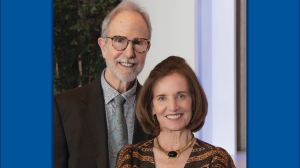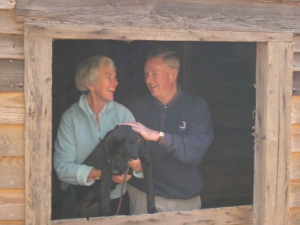A Heartfelt Friendship: Williams-Wallace Biomedical Research Fund Endowment Honors Mentors
To commemorate the 50th reunion of his Duke University School of Medicine class, R. Sanders “Sandy” Williams, MD’74, HS’77-’80, P’09 and Jennifer Scheid Williams, PA-BHS’74, P’09, made a $1 million commitment to establish the Williams-Wallace Biomedical Research Fund in honor of their friends and mentors, Andrew Wallace, MD’59, HS’59-’61,’63-’64, P’89, and his late wife, Barrie Wallace, AB’58, P’89. The Williams-Wallace Fund will provide five years of support to laboratory-based research projects conducted by a physician-scientist in the School of Medicine. While the first project will be focused on cardiology, ensuing projects may be in another specialty.
Sandy Williams believes that the health of academic medical centers requires active physician-scientists. His leadership roles at Duke — where he served as a professor of medicine, dean of the School of Medicine, and founding dean of the Duke-NUS Medical School in Singapore — and at other medical institutions helped Williams understand the importance of significant philanthropic gifts to advance medical science.
While the Williamses have long been generous supporters of the School of Medicine, they decided to make this gift in honor of the Wallaces. Andy Wallace, now professor emeritus of medicine, joined the faculty in the Department of Medicine in 1963 and was chief of the Division of Cardiology from 1969-1981.
“Andy has always personified to me the best traits and highest values that I associate with being a Duke doctor: dedication to patients, imagination in research to advance medicine, generosity in inspiring students and trainees, and courage in pursuing new initiatives,” said Sandy Williams. “He is one of the singular founders of the field of cardiac electrophysiology.”
Wallace’s leadership of Duke’s Division of Cardiology led to “a golden age” for Duke, according to Williams.
“Andy stood out among group of outstanding academic leaders who personified excellence at Duke in the late 1950s into the 1980s,” said Williams. “He led Duke’s Division of Cardiology to preeminence in cardiac electrophysiology, molecular cardiology, coronary care, cardiac imaging, data science in cardiology, clinical trial design and execution, and preventive cardiology.”
Physicians and physician-scientists from all over the world flocked to Duke to share in this magic. Nobel Prize laureate Robert J. Lefkowitz, MD — one of the physicians recruited to Duke by Wallace — said that Wallace is “essentially responsible for my career.”
In the early 1970s, Lefkowitz, then a cardiology fellow at the Massachusetts General Hospital, gave a presentation at a meeting of the American Heart Association. After attending that talk, Wallace persuaded Lefkowitz to join the faculty at Duke.
“Andy, who is one of my favorite people, saw something in me when I was 30 years old that I didn't see in myself, nor did anybody else,” said Lefkowitz, Duke Health Distinguished Professor of Medicine. “I wonder how my career would have played out were it not for that serendipitous afternoon after which he jump-started my career.”
Edward Prichett, MD, HS’74-‘76, consulting professor in the Department of Medicine and former chief of the Division of Clinical Pharmacology, also spent his career at Duke due to Wallace’s leadership. “Andy trained more than 100 cardiology fellows, including me, and was involved in our careers at a granular level,” said Pritchett.
He said that Wallace nurtured younger doctors and paved the way for their success by providing support, reviewing manuscripts and grant applications, and serving as a role model.
As young faculty members in Cardiology, Pritchett and Willams were recruited by other medical schools to establish research programs. “These were good places that offered us exciting opportunities,” said Pritchett. “But they didn't have Andy Wallace.”
Wallace’s support extended beyond cardiologists. In the mid-1960s, while still in high school, James Dorsey, BS'70, MD'74, saw a feature on the local news about Wallace’s work to develop Duke’s coronary care unit. Dorsey, who was working on a science project about EKG machines, wrote to Wallace.
“He invited me to meet him in the medical school library, gave me a tour of the clinic where the coronary care unit was going to be, and took me to his lab,” said Dorsey, who went on to become a cardiovascular surgeon.
When Dorsey enrolled at Duke as an undergraduate, he visited Wallace, who offered him a job if he ever needed one. Two years later, Dorsey took him up on that offer and proceeded to work in Wallace’s lab for six years.
Relationships have always been at the heart of Wallace’s work and the connection he shares with Williams and others.
“During the 1980s, both Jennifer and I worked under Andy’s tutelage, I on the faculty of cardiology and Jennifer as a physician’s assistant caring for Andy’s patients,” said Williams. “Jennifer and I were filled with admiration for Andy and Barrie’s warmly elegant style and their success as parents, community leaders in the arts, and gracious hosts for social occasions.”
Barrie Wallace, who passed away in January, was born into the Duke community. Her father served as superintendent of Duke University Hospital, and Barrie earned her bachelor’s degree from the university. Her commitment to her husband and three children and dedication to the community were legendary. During the 67 years in which she and Andy were married, she not only welcomed his colleagues and students into their home and lives, but she also served as a civic leader who had an impact on myriad community groups.
Kacie Wallace, AB'89, the daughter of Andy and Barrie, said that partnership and teamwork resonated throughout her parents’ marriage and their relationships with colleagues. Kacie shared how meaningful it was for Sandy and Jennifer — who both played such an important role in her dad’s work and her parents’ lives — to honor them with this endowment. Her dad agreed.
"The gift from Jennifer and Sandy is special on many levels,” said Andy Wallace, “Not only for what it will contribute to the future of medicine but as a lasting reminder of the deep gratitude Barrie and I feel for a friendship that has enriched our lives for so many years.”
Mary Klotman, BS'76, MD'80, HS'80-‘85, executive vice president for health affairs at Duke University and dean of Duke University School of Medicine, said the Williamses’ gift will help advance biomedical science.
“We are so grateful to Sandy and Jennifer Williams for their leadership and generosity, which will strengthen the ability of physician-scientists at Duke to pursue their critically important work,” Klotman said. “The Williamses and Wallaces are great examples of the dedication, passion, and brilliance of our Duke School of Medicine alumni, faculty and families.”
The Williams' hope that other alumni, faculty, and community members will join them in creating endowments to further research at Duke.
“Our gift alone won't do a lot to increase the number of physician-scientists, but it will give some researchers a meaningful level of extra support,” said Sandy Williams. “Together with other loyal Duke alumni donors, we can have a tremendous impact.”




